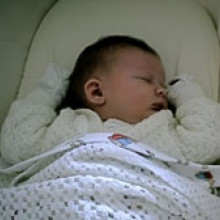A new IVF fertility treatment
A baby has been born in the US using a new genetic screening test for IVF embryos
In this episode

00:00 - A new IVF fertility treatment
A new IVF fertility treatment
This week, Connor Levy became the first IVF baby to be born using a new screening technique called next generation sequencing. This is a new way to check how healthy embryos are before they are implanted. Here's the Quickfire Science on IVF and Next Generation Sequencing with Kate Lamble and Priya Crosby.
- IVF stands for in vitro fertilisation and is used to overcome infertility in couples wishing to become pregnant.
- In IVF an egg is taken and fertilised by a sperm outside the body. The newly formed embryo is then implanted in the uterus of either the biological mother or a surrogate, where the pregnancy continues as normal.
- Louise Brown was the first baby born through IVF in 1978. Since then thousands of families have under gone the procedure.
- Despite being so popular IVF is not always successful. It can also lead to multiple births if more than one embryo is implanted and all survive.
- One cycle of IVF costs around £5000. In the UK the NHS offers up to three cycles of IVF to women under 40.
- Genetic screening can be carried out to check for specific genetic diseases which may affect quality of life, like cystic fibrosis. So that only healthy embryos are implanted.
- Next Generation Sequencing, used on Conor Levy, takes a more general approach, sequencing around 2% of the embryos DNA which can reveal the number of chromosomes in the embryo, as abnormal chromosomes are one of the most common reasons for miscarriage.
- This new screening technique can increase the success rate by of IVF by up to 50%. This should limit the number of cycles needed before success, saving people money and heartache.
- Opponents have suggested that this is another step towards designer babies, where embryos could be chosen based on traits such as hair colour, height or intelligence.
- The inventor of the technique has said that he can't imagine people wanting to go though the strains of IVF for something trivial. But it's been suggested that laws may be altered so that only genes linked to disease could be screened.
- Previous Souping up Solar
- Next Power from Poo?





Comments
Add a comment